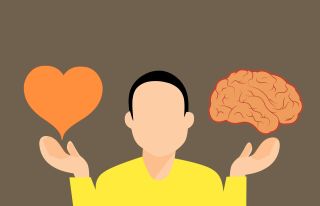Intuition
The Dangers of Intuition
Gut instincts can provide useful shortcuts, but they can also be misleading.
Posted March 24, 2023 Reviewed by Davia Sills
Key points
- Intuition relies on simple associations that save cognitive resources.
- Those associations are useful in stable environments, but can be dangerous in our complex, fast-changing world.
- Repeating successful behaviors, following familiar paths, or searching for simple patterns are all cognitive shortcuts that might breed disaster.
The power of intuition is undeniable. So is its potential for error.
This is the second post in the “Making Better Decisions” series, which started with this post. Today, I want to convince you that you should be very careful with your intuition, and maybe stop trusting it entirely when making important decisions.
“Intuition” is just a catch-all name for a series of associations that your brain executes (often automatically and unconsciously) in order to save cognitive resources. And they are not particularly sophisticated associations. Most of the time, what “feels right,” what makes you think that you are “following your gut,” comes down to a handful of very simple strategies, for example, reinforced or repeated behavior that worked more or less well in the past (see this previous post about reinforcement as intuition and why it is broken). Others include going with the familiar instead of the unfamiliar, imitating people who look successful, or simply trying to fit a pattern.
Those intuitions served us well for (limited) survival in the jungle or the savanna, and they serve us well when we are children learning the basics of the world, but they are often wrong in our modern, complex, fast-changing societies. Familiarity, reinforcement, or imitation will work well if we face exactly the same decision again and again, but they can be dangerous if we apply them in the wrong situation. In his instructive book Factfulness, the late Hans Rosling relates the anecdote of a group of Swedish medicine students who visited a hospital in Kerala, India. The group was already inside an elevator when a student showed up late. To stop the elevator doors from closing and allow the latecomer to join, one of the Swedish students stretched her leg out, placing it between the doors.
The elevator doors just crushed the student’s leg. The student yelled in excruciating pain as the elevator started moving upward, threatening to cut the leg off. She was only saved when the local host hit the emergency stop button and manually pried the doors apart, freeing the now-bleeding leg. The host later expressed his utter disbelief at the stupidity of the student. This was not stupidity, though: The student executed an automatic behavior, reinforced by the fact that all elevator doors in Sweden had sensors. Not those in Kerala at the time, though. Familiarity had reinforced an associative behavior that, applied in the wrong environment, could quite literally have cost the Swedish student a limb.

Intuition looks for simple patterns.
Intuition also makes you feel good when your brain spots a pattern. Consider the following riddle. If it takes 5 machines 5 minutes to make 5 bricks, how many minutes will it take 100 machines to make 100 bricks? This is one of a number of standard questions used in the Cognitive Reflection Test, which gives a rough measure of how reliant on intuition people are. A very large percentage of people answer “100.” Because, you know, 5-and-5 yields 5, so 100-and-100 must yield 100, right? Wrong. 100 machines are 20 groups of 5 machines. Each of those 20 groups of 5 machines will make 5 bricks in 5 minutes, so the 100 machines together will make 20x5=100 bricks in 5 minutes. They all run in parallel. So the correct answer is 5. The interesting observation is not that people make mistakes but that most people who make a mistake say “100.” Not 7, not 93. They give the intuitive answer and stop thinking because a satisfying pattern has been found.
This pattern-seeking intuition became rather embarrassing for an MSNBC newscaster and a New York Times editorial board member in 2020. At that time, the businessman Mike Bloomberg was a candidate for the Democratic nomination for U.S. President and was spending a considerable amount of money on advertising. Live on MSNBC, the commentator and the New York Times journalist very seriously read a tweet that stated: “Bloomberg spent $500 million on ads. The U.S. population is 327 million. He could have given each American $1 million and still have money left over.” The commentator and the journalist praised the tweet and used it to argue that there is too much money in politics, all the time failing to notice that $500 million divided by 327 million people is...a dollar and 53 cents per person. We can laugh at them, but maybe we should not be so harsh. All they did was intuitively trust a pattern. If 5-and-5 yields 5, a-million-and-a-million must yield a million, right?
Risking life and limb because "it never happened before."
Another problem with intuition is the lure of stability, which makes us ignore rare events. But to threaten your life or your livelihood, a major event needs only happen once. The argument that “it has never happened before” is going to be a poor consolation afterward.
When the subprime mortgage crisis triggered the Great Recession of 2008, all that investors had been doing was “business as usual.” Nothing dramatic had happened before just because they were investing in poorly-understood risks. When the German government of Angela Merkel decided to stop relying on nuclear energy in 2011 and increase Germany’s dependence on Russian natural gas, the supply of the latter seemed to be quite reliable, and certainly not threatened by a military conflict in Eastern Europe. And sure, you have driven your car a thousand times through that busy intersection. Nothing is going to happen if you rush through it while taking a phone call, right? All very intuitive. All very wrong. Is it actually clever to stop elevator doors from closing by placing your limbs between them, even if those doors have sensors in your country? Are you really willing to risk a leg to sensor malfunction? Sure, it has never happened before...
Intuition vs. expertise
So why are there so many people, and even books and serious academics, praising intuition? Well, are there, really? Your brain might be just exaggerating particular examples (and there are some) because it feels good to trust your intuition. After all, thinking is hard (consumes cognitive resources). Also, many examples of successful intuitive behavior are just due to expertise. If you are a highly-trained professional, say, an expert on detecting forgeries in classical art, your brain has been exposed to a lot of relevant information and has internalized a series of subtle associations to the point that they are not even conscious anymore. The result might be described as “intuition,” but it is really expertise. But if you are not an expert in a field, your intuition is untrained and will serve you poorly there. So, should you trust your gut? Only if you are an expert, or if the decision is not particularly important. In any other cases, stop, think, and gather data. More on that in other posts in this series!
References
Daniel Kahneman (2011). Thinking, Fast an Slow. London: Macmillan.
Hans Rosling, Ola Rosling, and Anna Rosling Rönnlund (2018). Factfulness: Ten Reasons We're Wrong About The World - And Why Things Are Better Than You Think. London: Sceptre.
Shane Frederick (2005). Cognitive Reflection and Decision Making. Journal of Economic Perspectives 19 (4), pp. 25-42.


